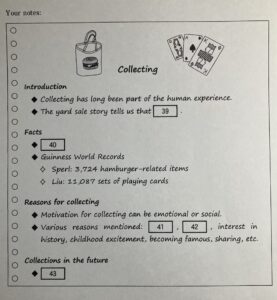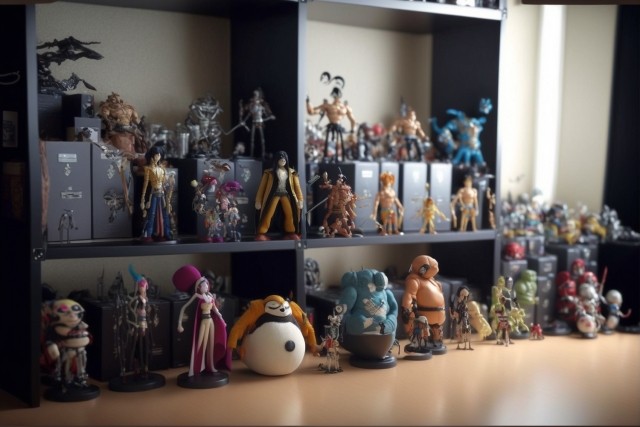第6問 A の模範解答・・・問題をやってから確認しましょう
それでは、先に模範解答です。
解答・・各3点
問1【 39 】ー 3 問2【 40 】- 4 問3【 41 】【 42 】ー 4– 6
問4【 43 】ー 1
第6問 A の解説
第6問 A では、「あなた」は学校でのディスカッショングループにいます。「あなた」
は次の記事を要約するように頼まれています。「あなた」はメモだけを使い、そのこと
について話すつもりです。
A You are in a discussion group in school. You have been asked to suumarize
the following article. You will speak about it, using only notes.
Collecting
❶ Collecting has existed at all levels of society, across cultures and age
groups since early times. Museums are proof that things have been collected,
saved, and passed down for future generations. There are various reasons for
starting a collection. For example, Ms. A enjoys going to yard sales every
Saturday morning with her children. At yard sales, people sell unwanted
things in front of their houses. One day, while looking for antique dishes. an
unusual painting caught her eye and she bought it for only a few dollars. Over
time, she found similar pieces that left an impression on her, and she now has
a modest collection of artwork, some of which may be worth more than she
paid. One person’s trash can be another person’s treasure. Regardless of how
someone’s collection was started, it is human nature to collect things.
❷ In 1988, researchers Brenda Danet and Tamar Katriel analyzed 80 years
of studies on children under the age of 10, and found that about 90% collected
something. This shows us that people like to gather things from an early age.
Even after becoming adults, people continue collecting staff. Researchers in
the field generally agree that approximately one third of adults maintain this
behavior. Why is this? The primary explanation is related to emotions. Some
save greeting cards from friends and family, dried flowers from special events,
seashells from a day at the beach, old photos, and so on. For others, their
collection is a connection to their youth. They may have baseball cards, comic
books, dolls, or miniature cars that they have kept since they were small.
Others have an attachment to history; they seek and hold onto historical
documents, signed letters and autographs from famous people, and so forth.
❸ For some individuals there is a social reason. People collect things such as
pins to share, show, and even trade, making new friends this way. Others, like
some holders of Guinness World Records, appreciate the fame they achieve for
their unique collection. Cards, stickers, stamps, coins, and toys have topped
unexpected. In September 2014, Guinness World Records recognized Harry
Sperl, of Germany, for having the largest hamburger-related collection in the
world, with 3,724 items; from T-shirts to pillows to dog toys, Sperl’s room is
filled with all things “hamburger.” Similarly, Liu Fuchang, of China, is a
collector of playing cards. He has 11.087 different sets.
❹ Perhaps the easiest motivation to understand is pleasure. Some people
start collections for pure enjoyment. They may purchase and put up paintings
just to gaze at frequently, or they may collect audio recordings and old-
fashioned vinyl records to enjoy listening to their favorite music. This type of
collector is unlikely to be very interested in the monetary value of their
treasured music, while others collect objects specifically as an investment.
While it is possible to download certain classic games for free, having the
same game unopened in its original packaging, in “mint condition,” can make
the game worth a lot. Owning various valuable “collector’s items” could ensure
some financial security.
❺ Tis behavior of collecting things will definitely continue into the distant
future. Although the reasons why people keep things will likely remain the
same, advances in technology will have an influence on collections. As
technology can remove physical constraints, it is now possible for an individual
to have vast digital libraries of music and art that would have been
unimaginable 30 years ago. It is unclear, though, what
technology will have on collections. Can you even imagine the form and scale
that the next generation’s collections will take?

問1 Choose the best option for【 39 】.
① a great place for people to sell things to collectors at a high price is a
yard sale
② people can evaluate items incorrectly and end up paying too much
money for junk
③ something not important to one person may be of value to someone else
④ things once collected and thrown in another person’s yard may be
valuable to others
問2 Choose the best option for【 40 】.
① About two thirds of children do not collect ordinary things.
② Almost one third of adults start collecting things for pleasure.
③ Approximately 10% of kids have collections similar to their friends.
④ Roughly 30% of people keep collecting into adulthood.
問3 Choose the best options for【 41 】and 【 42 】.
(The order does not matter.)
① desire to advance technology
② fear of missing unexpected opportunities
③ filling a sense of emptiness
④ reminder of precious events
⑤ reusing objects for the future
⑥ seeking some sort of profit
問4 Choose the best option for【 43 】.
① Collections will likely continue to change in size and shape.
② Collectors of mint-condition games will have more digital copies of them.
③ People who have lost their passion for collecting will start again.
④ Reasons for collecting will change because of advances in technology.
それでは、詳しく問題を見ていきます。
解説 – 記事を読んでまとめのメモを完成
👉どの問題も「ある設定」のもとでの「英文読解」なので、
一番最初にするべきことは、その「設定」をしっかり把握することです。
▶︎その「設定」が、問題の最初に説明されているので、
まずは、それをしっかりと確認します。
【設定】
A You are in a discussion group in school. You have been asked to suumarize
the following article. You will speak about it, using only notes.
[登場人物]
・「あなた」
[設定状況]
学校でのある話し合いのグループにいる「あなた」は
▶︎次の記事を要約するように頼まれ、
▶︎メモだけを使い、そのことについて話す予定です。
▶︎この「次の記事」が、その下に続いているわけです。
◎「その記事」のタイトルは、
“Collecting” 「収集」というものです。

👉ここまでを、
理解した上で、「先に」問題の選択肢を簡単にチェックしてから、設問の後の
「記事」とその後にある「メモ内容」をチェック
したほうが良いようです。
問1について
【選択肢のチェック】
問1 Choose the best option for【 39 】.
① a great place for people to sell things to collectors at a high price is a
yard sale
② people can evaluate items incorrectly and end up paying too much
money for junk
③ something not important to one person may be of value to someone else
④ things once collected and thrown in another person’s yard may be
valuable to others
【内容】
問1【 39 】に入る最も適切な選択肢を選びなさい。
① 高価な値段でコレクターに物を売るのに最適な場所は、ヤード・セールです。
② 人は不正確に物を評価する可能性があるので、ガラクタに多大なお金を結局
支払うことになる。
③ ある人にとって重要でないものが、他の人にとって価値のあるものかもしれない。
④ 一度収集されたけど他の人の庭に捨てられたものは他の人にとって価値があるかも
しれない。
👉メモの【 39 】をよく見てみましょう。
Introduction
◆ Collecting has long been part of the human experience.
◆ The yard sale story tells us us that 【 39 】
👉日本語にすると…
導入
◆収集は長い間人間の経験の一部です。
◆ヤード・セールの物語は私たちに【 39 】を教えてくれます
▶︎ yard sale については、1段落目(❶) で述べられていますが、
最後の部分で、このような英文があります。
One person’s trash can be another person’s treasure. Regardless of how
someone’s collection was started, it is human nature to collect things.
「ある人のゴミは別な人の宝となりうるのです。その人の収集がどのように始まった
のかに関わらず、ものを集めると言うのは人間の本質です。」
👉ここから、正解は
③ something not important to one person may be of value to someone
else であることがわかります。【 39 】
※ The yard sale story tells us that something not important to one person may not be of value to someone else.
問2について
【選択肢のチェック】
問2 Choose the best option for【 40 】.
① About two thirds of children do not collect ordinary things.
② Almost one third of adults start collecting things for pleasure.
③ Approximately 10% of kids have collections similar to their friends.
④ Roughly 30% of people keep collecting into adulthood.
【内容】
問2【 40 】に入る最も適切な選択肢を選びなさい。
① およそ3分の2の子供たちは普通のものを集めない。
② ほとんど3分の1の大人は楽し身のために物を集め始める。
③ およそ10%の子供は友達と似ているようなコレクションを持っている。
④ だいたい30%の人は大人になっても集めることを続ける。
👉メモの【 40 】をよく見てみましょう。
Facts
◆【 40 】
◆ Guinness World Records
◇ Sperl:3,724 hamburger-related items
◇ Liu:11,087 sets of playing cards
👉日本語にすると…
事実
◆【 40 】
◆ ギネス世界記録
◇ Sperl:3,724個のハンバーガーに関するもの
◇ Lui:11, 087セットのトランプ
▶︎ここでは「事実」を述べている部分で、しかも選択肢を見ると「収集」に関する
データを取り扱っています。2段落目(❷)に調査結果に関するデータが示されて
います。
・studies of children under the age of 10 において
– and found that 90% collected something.
「10歳未満の子どもたちの研究では、90%が何かを集めているとわかった」
・approximately one third of adults maintain this behavior.
「大人の約3分の1はこの習慣を維持する ※この習慣=収集する習慣」
ここから、正解が
④ Roughly 30% of people keep collecting into adulthood. となります。
【 40 】
※ Facts
◆ Roughly 30% of people keep collecting into adulthood.
◆ Guinness Word Records …
問3について
【選択肢のチェック】
問3 Choose the best option for【 41 】and 【 42 】.
(The order does not matter.)
① desire to advance technology
② fear of missing unexpected opportunities
③ filling a sense of emptiness
④ reminder of precious events
⑤ reusing objects for the future
⑥ seeking some sort of profit
【内容】
問3【 41 】と【 42 】に最も適切な選択肢を選びなさい。(順不同)
① 技術を進化させたい欲望
② 予期せぬ機会を失くすんじゃないかという恐れ
③ 空虚という感覚を埋めること
④ 貴重な出来事の思い出
⑤ 将来のためにものを再利用すること
⑥ 何らかの利益求めること
👉メモの【 41 】【 42 】をよく見てみましょう。
Reasons for collecting
◆ Motivation for collecting can be emotional or social.
◆ Various reasons mentioned: 【 41 】, 【 42 】, interest in history,
childhood excitement, becoming famous, sharing, etc,
👉日本語にすると …
収集する理由
◆ 収集する動機は感情的なものでもあるうるし、社会的なものであるうる。
◆ 述べられてさまざまな理由:【 41 】, 【 42 】, 歴史への興味、
子ども時代の興奮、有名になること、共有すること など。
▶︎収集理由については、それぞれの選択肢を1つ1つチェックしてみましょう。
① desire to advance technology
➡️最後の5段落目( ❺)には、technology と collection の関係が述べられていて
As technology can remove physical constraints, it is now possible for an
individual to have vast digital libraries of music and art that would have been
unimaginable 30 years ago. 「技術が物理的な制約を取り除くと、今では個人が
30年前には想像できなかったような莫大な音楽と美術のライブラリーを所有する
ことが可能だ」とはありますが、「技術を進歩させよう」という気持ちはないので、❌
② fear of missing unexpected opportunities
➡️4段落目(❹)の真ん中あたりに、
but some lean toward the more unexpected.「しかしもっと意外なものに傾く人も
います」とありますが、「チャンスをなくすのを恐れる」のような内容は書かれて
いないので、❌
③ filling a sense of emptiness
➡️おそらくここの emptiness は「心の空虚感」のことを示して、「心の空虚感」を
埋める、のようなことは書かれていないので、❌
④ reminder of precious events
➡️2段落(❷)の真ん中あたりに、
Some save greetings from friends and family, dried flowers from special events,
seashells from a day at the beach, old photos, and so on.「友達や家族からの
手紙、特別な出来事でのドライフラワー、浜辺でのある日の貝殻、古い写真などを持っ
ておく人もいます」とあるので、⭕️
⑤ reusing objects for the future
➡️最後の5段落(❺)で、少し future の話が出てきますが、「再利用」するなどの話
は書かれていないので、❌
⑥ seeking some sort of profit
➡️4段落目(❹)には、
・while other collect objects specifically as an investment.
「一方はっきりと投資目的でものを収集する人もいます」
・Owning various valuable “collector’s items” could ensure some financial security.
「さまざまな価値のあるコレクターズ・アイテムを所有すれば財政面の保障を確かなもの
にすることができるだろう」
とあるので、⭕️
👉ここから、正解は、
④ reminder of precious events
⑥ seeking some sort of profit となります。【 41 】【 42 】となります。
※【 41 】【 42 】④ ⑥
問4について
【選択肢のチェック】
問4 Choose the best option for【 43 】.
① Collections will likely continue to change in size and shape.
② Collectors of mint-condition games will have more digital copies of them.
③ People who have lost their passion for collecting will start again.
④ Reasons for collecting will change because of advances in technology.
【内容】
問4【 43 】に最も適した選択肢を選びなさい。
① コレクションは、大きさと形において変わり続けやすいだろう。
② 完璧な状態のゲームのコレクターはより多くのデジタルのコピーを所有するだろう。
③ 収集の情熱を失った人はまた始めるだろう。
④ 技術の進化のため収集する理由を変わるだろう。
👉メモの【 43 】をよく見てみましょう。
Collections in the future
◆【 43 】
👉日本語にすると …
将来の収集について
◆【 43 】
▶︎将来については5段落(❺)目に記されているので、そこを見てみましょう。
・It is unclear, though, what other impacts technology will have on
collections.
「だけれども、技術が収集にどんな他の影響を与えるかは分かりません。」
・Can you even imagine the form and scale that the next generation’s
collections will take?
「みなさんは次の世代の収集がとるであろう形や規模を想像することすらできますか」
👉ここから、【 43 】の正解は、
① Collections will likely continue to change in size and shape. ととなります。
※【 43 】①
これで、
第6問 A を終わります。
次は、最後の第6問 B に入ります。



コメント